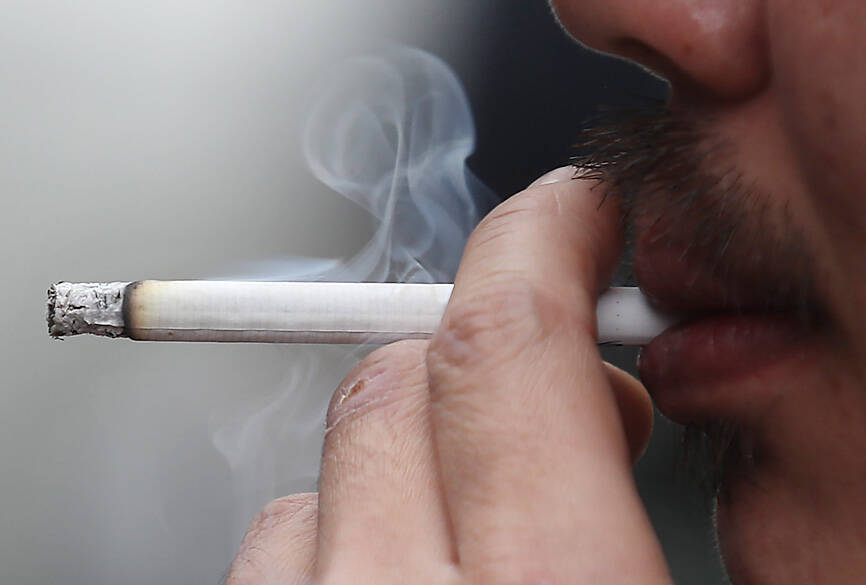Twenty-six percent of the nation’s junior, senior and vocational-high school students live in environments that expose them to secondhand smoke, the Health Promotion Administration (HPA) said, citing its latest survey as it urged people to quit smoking.
Fewer teenagers are being exposed to secondhand smoke at home each year, as the overall rate of tobacco use has been declining, the agency said.
The latest survey results showed that 26.3 percent of junior-high school students were exposed to secondhand smoke at home last year, down from 30.7 percent in 2019, while the rate for senior and vocational-high school students was down from 30.5 percent to 26.2 percent, it said.

Photo: CNA
However, secondhand smoke can be an “invisible killer,” causing about 3,000 deaths in Taiwan per year, and even short-term exposure can lead to higher risks of cardiovascular diseases, it said.
The WHO’s International Agency for Research on Cancer has listed secondhand smoke as a Group 1 carcinogen, said Liu Chia-hsiu (劉家秀), a senior technical specialist at the HPA’s Smoke Hazard Prevention Division.
Studies in other countries have shown that teenagers whose parents smoke are more likely to suffer from bronchitis and pneumonia compared with those whose parents do not smoke, she said.
Secondhand smoke might also lead to more serious and frequent asthma attacks in teenagers, while infants who are exposed to secondhand smoke might die of sudden infant death syndrome, Liu said, adding that exposure before or after birth can lead to worse lung conditions.
Smoking on balconies or in bathrooms does not prevent exposure of family members to secondhand smoke, as smoke can be absorbed by hair, skin, clothes, curtains and carpets for up to half a year, pediatrician Chen Mu-jung (陳木榮) said.
People who want to quit smoking can seek help from the HPA’s smoking cessation services provided by doctors and health professionals in 3,500 medical institutions across the country, the HPA said.
People can also call the smoking cessation hotline for professional support at: 0800-636-363.

A magnitude 4.9 earthquake struck off Tainan at 11:47am today, the Central Weather Administration (CWA) said. The hypocenter was 32.3km northeast of Tainan City Hall at a depth of 7.3km, CWA data showed. The intensity of the quake, which gauges the actual effect of a seismic event, measured 4 in Tainan and Chiayi County on Taiwan's seven-tier intensity scale, the data showed. The quake had an intensity of 3 in Chiayi City and County, and Yunlin County, while it was measured as 2 in Kaohsiung, Nantou County, Changhua County, Taitung County and offshore Penghu County, the data showed. There were no immediate reports of

‘DENIAL DEFENSE’: The US would increase its military presence with uncrewed ships, and submarines, while boosting defense in the Indo-Pacific, a Pete Hegseth memo said The US is reorienting its military strategy to focus primarily on deterring a potential Chinese invasion of Taiwan, a memo signed by US Secretary of Defense Pete Hegseth showed. The memo also called on Taiwan to increase its defense spending. The document, known as the “Interim National Defense Strategic Guidance,” was distributed this month and detailed the national defense plans of US President Donald Trump’s administration, an article in the Washington Post said on Saturday. It outlines how the US can prepare for a potential war with China and defend itself from threats in the “near abroad,” including Greenland and the Panama

The Chinese Nationalist Party (KMT) is maintaining close ties with Beijing, the Democratic Progressive Party (DPP) said yesterday, hours after a new round of Chinese military drills in the Taiwan Strait began. Political parties in a democracy have a responsibility to be loyal to the nation and defend its sovereignty, DPP spokesman Justin Wu (吳崢) told a news conference in Taipei. His comments came hours after Beijing announced via Chinese state media that the Chinese People’s Liberation Army’s Eastern Theater Command was holding large-scale drills simulating a multi-pronged attack on Taiwan. Contrary to the KMT’s claims that it is staunchly anti-communist, KMT Deputy

RESPONSE: The government would investigate incidents of Taiwanese entertainers in China promoting CCP propaganda online in contravention of the law, the source said Taiwanese entertainers living in China who are found to have contravened cross-strait regulations or collaborated with the Chinese Communist Party (CCP) could be subject to fines, a source said on Sunday. Several Taiwanese entertainers have posted on the social media platform Sina Weibo saying that Taiwan “must be returned” to China, and sharing news articles from Chinese state media. In response, the Mainland Affairs Council (MAC) has asked the Ministry of Culture to investigate whether the entertainers had contravened any laws, and asked for them to be questioned upon their return to Taiwan, an official familiar with the matter said. To curb repeated